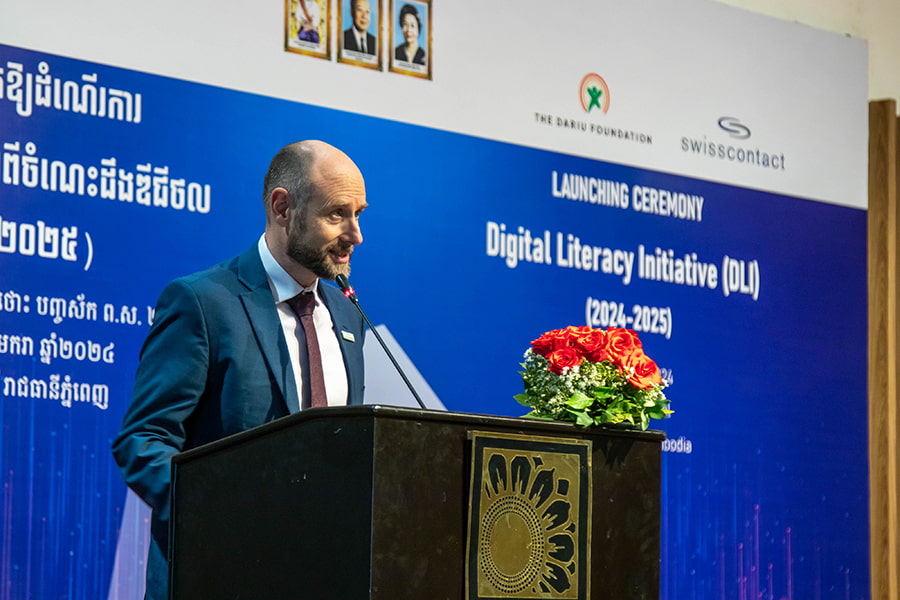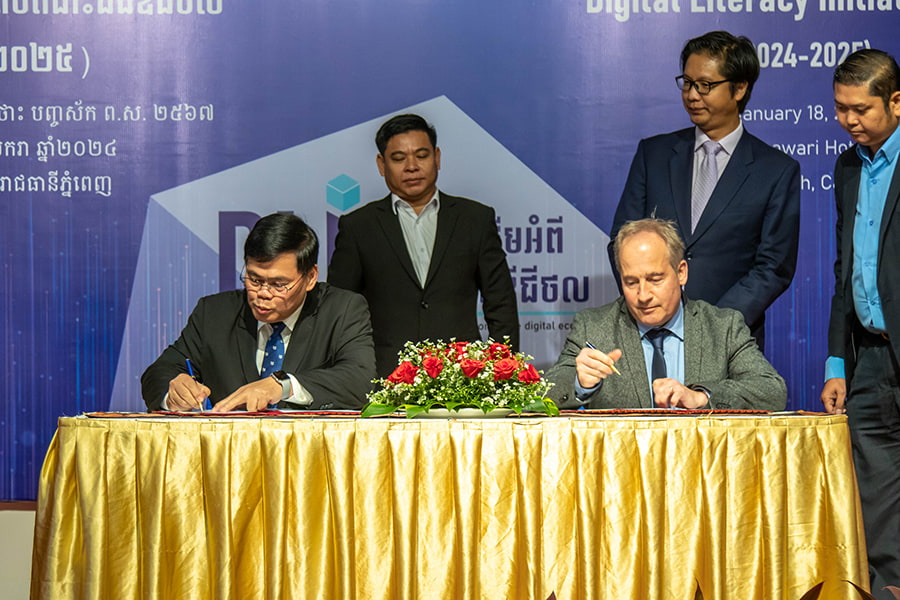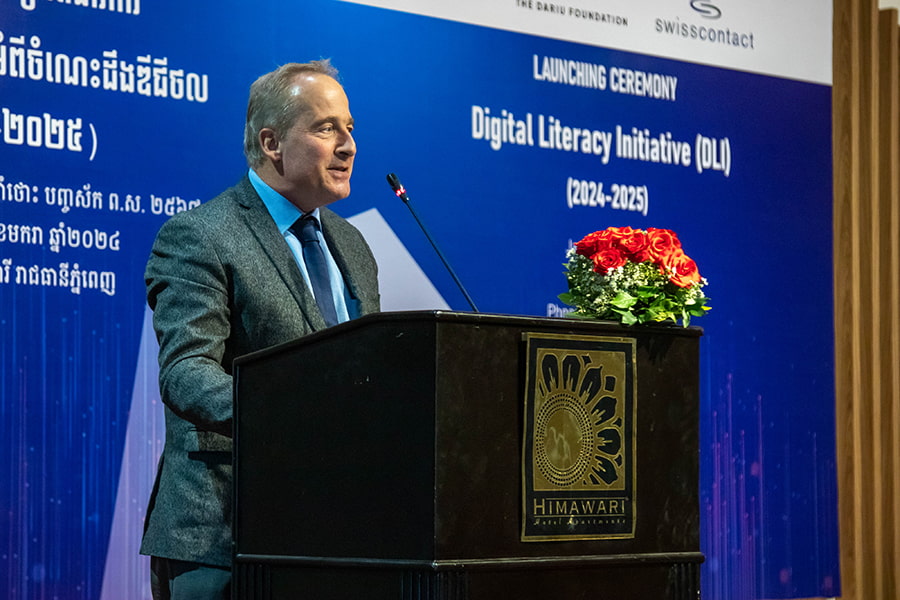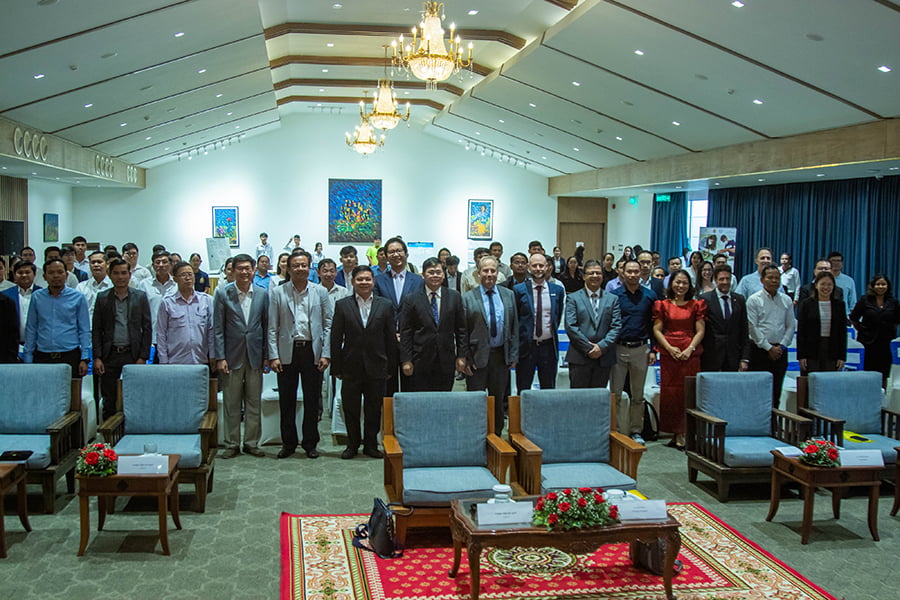On January 18, 2024, the Digital Literacy Initiative (DLI) was officially launched at the Himawari Hotel Apartments. This initiative, spearheaded by the Dariu Foundation in collaboration with the Ministry of Education Youth and Sports (MoEYS) and the Ministry of Labor and Vocational Training (MLVT), aims to improve digital literacy education for Cambodian youth, especially in rural areas.
The launch was attended by H.E. Dr. Om Romny, Secretary of State at the MoEYS, Daniel Keller, Vice President of the Dariu Foundation, Markus Buerli, Director of Cooperation at the Swiss Agency for Development and Cooperation (SDC) in Cambodia, and Philippe Schneuwly, CEO of Swisscontact, along with a total of more than 90 participants.
The program, implemented by Swisscontact, will focus on public high schools and Technical and Vocational Education and Training (TVET) Schools in Siem Reap and Battambang provinces over a two-year period (2024-2025), with the overarching goal of integrating youth into the digital economy by bridging the digital gap and equipping them with necessary digital skills.
Delivering his opening speech at the launch event, Schneuwly noted that Cambodia has a very large youth population, which is a great asset and opportunity, but also a big responsibility for society because people need to have access to the right resources to be able to develop the needed skill sets to survive in a rapidly changing world.
“One of the most important changes for our work is digitalisation,” he said. “The speed of change is simply amazing. Artificial intelligence (AI) has the potential to completely disrupt many processes that we have been used to over many decades. Certain jobs may completely disappear, while skills requirements for other jobs may expand and change, and new jobs will also emerge.”
Main Goals And Activities Of The Digital Literacy Initiative (DLI) In Cambodia

While Cambodia has established some level of digital literacy education delivery to students, several challenges still remain. Insufficient facilities, a curriculum lacking practical application, and a shortage of competent teachers in public schools are some of the main obstacles identified by the DLI.
“Current computer courses [offered at high schools] do not have a practically oriented curriculum, and there are only a few schools overall that teach coding or a more practical curriculum in ICT, so students lack opportunities to develop more innovative projects, also through their extracurricular activities,” shared Erica Wu, the Project Manager of DLI at Swisscontact.
She explained that TVET schools face similar challenges and also lack classes focused on entrepreneurship in the curriculum, which is particularly important given that most TVET students will look to enter the job market upon graduation.
“There's a limited focus on helping them to transform their technology related ideas into business ideas, so that's also one of the challenges that we see and understand in the current system,” added Wu.
To address those challenges, the DLI program will look into providing support in four areas:
- Capacity Development for Schools: Complementing existing computer labs at high schools, developing a curriculum that includes coding education and digital entrepreneurship, and offering professional development training for teachers;
- Training for Students: Offering students basic level coding knowledge and skills through coding courses. At TVET schools, the focus will also be on further enhancing digital entrepreneurial skills to aid students in transforming their inventions into revenue generating activities;
- Establish and Strengthen Coding Clubs: Upon delivering coding courses, the DLI program will assist students in developing their own technology driven projects and help them participate in coding competitions;
- Consolidate and Scale-up: All materials of the coding courses, coding clubs, and digital entrepreneurship courses will be made available free of charge on public platforms for schools to adopt. The lessons learnt from implementing this digital literacy education program will also be shared publicly.
The project has chosen students from public high schools and TVET schools in Siem Reap and Battambang provinces as its main target group, and aims to directly benefit at least 1,200 students over a two-year period.
"Learning to code benefits education in multiple ways,” emphasised Daniel Keller, Vice President of the Dariu Foundation, during his remarks.
Through coding, students learn to think critically and to solve problems when something does not work. Moreover, in Coding Clubs, students develop applications to address practical problems in society. In doing so, they learn leadership, presentation skills, communication skills, time management, and designing project proposals with budgets. These competencies are important for future higher education and professional activities.
Improved Digital Literacy To Boost Cambodia’s Economic Development

During his remarks, Schneuwly stressed that improving digital literacy levels will also contribute to the bigger picture of aiding economic development, by ensuring that the workforce has the necessary skill sets to keep up with digital trends and developments in the region and across the world.
“To create economic development… it is required that [the population] has the necessary skills so they can increase competitiveness,” said the Swisscontact CEO.
This will become even more important in Cambodia as the country is moving to become a middle-income country. Young people need to be exposed to digitalisation in order to become aware of related opportunities, to get interested in future education and to be prepared for future training…
Raising Cambodia's Standing In Southeast Asia Through Higher Digital Literacy Rates
Keller also spoke to B2B Cambodia about the Dariu Foundation’s experience in other countries, particularly the 10 years of digital literacy programs implemented in Vietnam, which has helped to inform the DLI program in Cambodia.
“This is the first project we are launching in Cambodia and we are very pleased and honoured to be here,” he said. “The program has been tailored to Cambodia, of course, but we hope that we can apply the lessons learned from Vietnam to Cambodia.”
“But this is a Cambodian program, it's not a program of the Dariu Foundation,” Keller stressed. “We provide funding and technical support, but we want to ensure there is a very strong ownership by the Cambodian government.”

In working with the government to develop school programs focused on building digital skills, Keller said he hopes to see the developed teaching materials expand beyond the DLI program’s target sites in the coming years, and become incorporated into the national school curriculum just as the foundation saw happen in Vietnam.
“In Vietnam, coding was not part of the curriculum, but after piloting [this initiative there] and implementing coding courses in ten provinces, it has now become an official part of the curriculum,” he shared. “Now in Vietnam, every high school student learns how to code.”
But it’s not only the government and implementing NGO that will need to work towards this goal; the combined efforts of all stakeholders, including the involvement of the private sector, will be required to achieve tangible results in digital literacy improvement over the course of the DLI program and the many years beyond.
We would like to involve the private sector here in two ways: first, in providing funding for the initiative, but second, to also provide us with technical input, because the private sector here… have experienced what the job market needs. For us, it's really important that [this project isn’t just] a theoretical thing, but that we need to actually satisfy the needs of the market.
On where he believes Cambodia currently stands in the region in terms of its digital literacy levels, Keller said he has observed remarkable changes in the Kingdom over the past 30 years, and while the country may still be slightly behind neighbours like Vietnam, it is well on track to quickly catching up.
“You can see a dynamic development [has taken place] in Cambodia, which I wouldn't have expected,” he said. “If I compare the Cambodia of 25 or 30 years ago with the Cambodia of today, I'm really impressed and I would say Cambodia is on a good way to becoming like Vietnam, now only slightly behind.”
With strong partnerships and a clear focus on practical digital literacy education, the DLI program hopes to unlock new opportunities for Cambodian youth and to empower them to thrive in the digital age.
